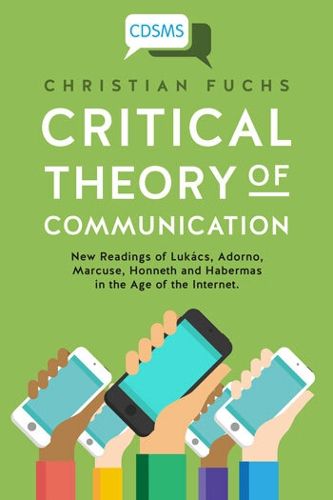Readings Newsletter
Become a Readings Member to make your shopping experience even easier.
Sign in or sign up for free!
You’re not far away from qualifying for FREE standard shipping within Australia
You’ve qualified for FREE standard shipping within Australia
The cart is loading…






This book contributes to the foundations of a critical theory of communication as shaped by the forces of digital capitalism. One of the world’s leading theorists of digital media Professor Christian Fuchs explores how the thought of some of the Frankfurt School’s key thinkers can be deployed for critically understanding media in the age of the Internet. Five essays that form the heart of this book review aspects of the works of Georg Lukacs, Theodor W. Adorno, Herbert Marcuse, Axel Honneth and Ju rgen Habermas and apply them as elements of a critical theory of communication’s foundations. The approach taken starts from Georg Lukacs Ontology of Social Being, draws on the work of the Frankfurt School thinkers, and sets them into dialogue with the Cultural Materialism of Raymond Williams.
Critical Theory of Communication offers a vital set of new insights on how communication operates in the age of information, digital media and social media, arguing that we need to transcend the communication theory of Habermas by establishing a dialectical and cultural-materialist critical theory of communication.
$9.00 standard shipping within Australia
FREE standard shipping within Australia for orders over $100.00
Express & International shipping calculated at checkout
This book contributes to the foundations of a critical theory of communication as shaped by the forces of digital capitalism. One of the world’s leading theorists of digital media Professor Christian Fuchs explores how the thought of some of the Frankfurt School’s key thinkers can be deployed for critically understanding media in the age of the Internet. Five essays that form the heart of this book review aspects of the works of Georg Lukacs, Theodor W. Adorno, Herbert Marcuse, Axel Honneth and Ju rgen Habermas and apply them as elements of a critical theory of communication’s foundations. The approach taken starts from Georg Lukacs Ontology of Social Being, draws on the work of the Frankfurt School thinkers, and sets them into dialogue with the Cultural Materialism of Raymond Williams.
Critical Theory of Communication offers a vital set of new insights on how communication operates in the age of information, digital media and social media, arguing that we need to transcend the communication theory of Habermas by establishing a dialectical and cultural-materialist critical theory of communication.